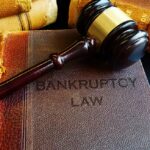If you are like the millions of Americans struggling with debt, it is important that you know that there are options. While bankruptcy may be one of those options, it may not be the best fit for your specific financial situation. In fact, there are several alternatives to bankruptcy that may allow you to eliminate or greatly reduce your total debt. Debt consolidation has been used for years to reorganize debt and save money on high interest loans. Let’s take a closer look at debt consolidation, including how it compares to bankruptcy in helping you remove the shackles tying you to overwhelming debt.
What Is Debt Consolidation?
Debt consolidation is the process of paying off all of your existing debt with one new loan. It has a number of benefits. Mainly, consolidation helps you keep track of all your debt by placing it under one repayment plan. Additionally, if you have multiple debts with high interest rates, consolidating those debts into one low interest loan may save you money in the long run. Because a consolidated loan may have a longer repayment period, you may also be able to lower your monthly payment.
Debt consolidation does have its risks. One of the most common forms of debt consolidation is the zero-interest credit card. These cards are offered at an introductory rate of zero percent. These cards are great if you plan on paying them off before the introductory period is over. What you may not know is that after the introductory rate ends, the interest rate may balloon up to north of 20%.
Debt relief services offer to consolidate your debt for you. You then make one single monthly payment for all of your debts. What these services don’t tell you is that there is no guarantee that you will have a lower interest rate on your new consolidated loan. Additionally, because these consolidated loans have longer repayment periods, you may end up paying more than you would by paying off the individual loans yourself.
What Is Bankruptcy?
Bankruptcy is different from consolidation in that it is a legal process. When you petition the court for bankruptcy, you are basically asking the court to temporarily manage your finances for you. This can include the discharge of certain unsecured debt. What this means is that you may be able to have your debt wiped out. Alternatively, for those who have monthly income, bankruptcy may offer a path toward a financial fresh start by creating a repayment plan for certain debts. This form of bankruptcy is often used in order to avoid the foreclosure on a home. The downside of bankruptcy is that your credit rating will be severely impacted. As a result, you will likely have difficulty establishing new lines of credit for up to ten years. Still, in the end, bankruptcy can provide you with a clean slate and a path toward financial freedom.
Bankruptcy, Consumer Protection Lawyers
If you happen to be struggling with crippling debt these days, you are not alone. Fortunately, you can take steps to resolve your situation. Consumer Law Pro lawyers specialize in consumer protection and bankruptcy. Having assisted more than 2,000 clients resolve their financial dilemmas, we have the knowledge and expertise to place you in a better light with respect to your finances. If you want to learn more about debt relief solutions and filing for bankruptcy, the lawyers at Consumer Law Pro are here to help. To consult with Consumer Law Pro, call (303) 297-7729 or contact us online.

